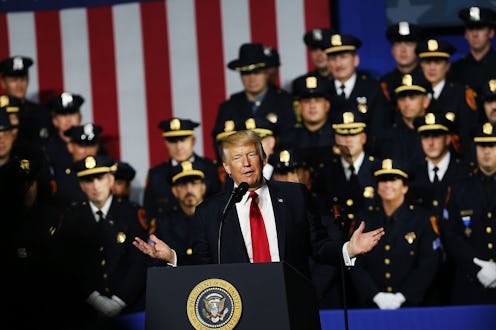News
Dear NYPD, Here's Why You Can't Be "Racist" Against Cops

Over the weekend, a union representing the officers of the New York Police Department ― the Sergeants Benevolent Association ― released a highly controversial internet video declaring themselves to be the victims of racism. Specifically, "blue racism," the notion being that for some people, the fact that a person is wearing a police uniform is enough information with which to render judgment. There's a big, gaping flaw in that claim, however, simple though it sounds ― what the NYPD "Blue Racism" video gets wrong is that race and career are not in any sense equivalents.
In the video, a narrator intones that "the average person" doesn't see police officers for the family and community-oriented human beings they are, but rather judge them on the basis of a broad stereotype thanks to their profession. Had the video focused on this point more narrowly, omitting any comparisons to personal, systemic, or institutional racism (which is an ever-present force in American policing), whatever you think of the message, it wouldn't have been nearly as inflammatory.
However, the narrator doesn't stop at simply trying to humanize police officers. Rather, he insists they're the victims of "an even more racist lens":
They don't even label me based on being African-American, Latino, Asian, Caucasian, and so on. They tend to see an even broader stereotype through an even more racist lens. When they look at me, they see blue.
There's a huge, glaring problem with this, which can be summed up pretty succinctly: your career and your race are entirely different things. One is an immutable part of your identity, something that can't be discarded at the end of a long day like a uniform that needs a wash, or given up altogether.
The other is a consciously made, deliberate choice to pursue a given calling in life. In this case, the career officers have chosen puts them directly in harm's way and presents myriad challenges, but also entails them working in a criminal justice system that produces deeply racist outcomes.
Furthermore, the very line of narration that first raises the topic of race actually disproves its own point. Again, the complaint is that police officers are seen merely as "blue," even if they're black, white, Latino, or Asian. That's explicitly not racism ― that's evaluating an entire group based not on race, but on job description.
In short, if police unions like the SBA want to promote a more humanizing view of the law enforcement officers that they represent, there are plenty of constructive ways to do that. But insisting that police as a group are racially victimized? And asserting that their critics, the most vociferous of whom are often people of color, are the real racists?
That's less an attempt at outreach than a deliberate attempt to provoke, a lot like when police and their supporters appropriate Black Lives Matter, a movement for some of the least privileged in society whose lives are grossly undervalued by society, and turn it into Blue Lives Matter, a movement lionizing some of the most powerful people in day-to-day life. It is, in other words, another form of racism in itself.